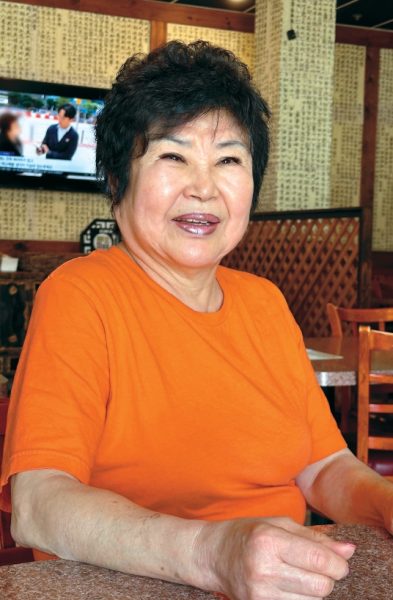A saying among young Korean-American diners reads, “At a good Korean restaurant, you see many seniors with alcohol accompaniment even from lunch.” This is the case with the Yet Gol restaurant in Los Angeles Koreatown. It is a restaurant where middle-aged and elderly regulars enjoy soju with their food from as early as lunchtime.
The owner, Deokja Lee, never learned to cook professionally. Nevertheless, not only Koreans but also people of other ethnicities keep visiting the restaurant. The secret is her “hand-made” flavor. She inherited her mother’s cooking secrets. Her restaurant has been serving authentic Korean food for eight years in Koreatown.
How are authentic Korean restaurants doing now compared to the past?
“There were a lot of them in the past. Technically, all Korean restaurants back then were authentic Korean restaurants. Nowadays, you don’t see as many. I think it’s because it’s getting harder to run a restaurant in general.”

How is Korean food in terms of variety now?
“It has expanded much, and it is still expanding. In the past, many non-Korean customers thought that K BBQ was the only kind of Korean meat dish. Now they know a lot of them like bossam, pork feet, and sweet and spicy stir-fried pork. But I hope they know that there’s more than just meat-centered dishes. I think it could be because of the food culture.”
How do you feel about Korean fusion cuisine?
“In my experience, I think it’s best to show authentic Korean food as it is if you want to introduce Korean food. I’ve been serving the same food that my mom used to cook in Korea, and even if I don’t make any changes, people here seem to enjoy it, especially the banchan (side dishes). We serve 12 different banchan, and our customers love them.”
Do you make them all by yourself?
“Yes, when I first started the restaurant, I would come out at 5:30 a.m. every day and make side dishes without taking one day off. I make all the kimchi too. Every two months, I make kimchi with Korean cabbage. My knees are worn out, but Korean food is made with a sincere heart, I think. I feel good when I look at all the banchan I hand-made.”
Which Korean food do you like better, fusion or authentic?
“It’s hard to say, but the non-Korean customers who come to our restaurant want to eat authentic Korean food as it is. When I ask them if they want it less spicy, they say no. They want it the way it originally tastes, like if it’s spicy, it is a spicy food. Then, they start to expand their menu choices. At first, many of them start with something familiar like bulgogi. After the second or third time, they order something more like a Korean home meal like grilled mackerel or grilled cutlassfish.”
What are the strengths and weaknesses of Korean food?
“The strength of Korean food is that its original flavor lasts for a long time. No matter who cooks it, the basics don’t change easily. Persistence means familiarity. The weakness is that making Korean food like banchan is laborious and expensive. It needs a lot of ingredients.”
What is Korean food?
“It is the flavor from ‘hand-made’ and the generosity from a sincere heart. One of the reasons why Korean food is so sustainable is the hand-me-down flavor. I inherited my mother’s cooking, and even though I never learned to cook professionally, I just do what she would do to make the food in Korea, and our customers say it tastes good. Many of them say my food recalls a lot of their childhood memories. Korean food is also about generosity, where ingredients are not spared and the food is cooked with a lot of love.”
What do you think is necessary to globalize Korean food?
“We need diversity. I once explained the compatibility of Korean food and alcohol to a customer. I showed them how to eat makgeolli (rice wine) and bindaetteok (mung bean pancake) together, and they really liked it. They understood the combination and harmony of Korean food and had it again on their next visit. The point is that the range of authentic Korean food needs to be expanded. Not only just Korean food itself but also the food culture that’s within, like what alcohol goes well with Korean food, how the food is prepared, and what culture and history are incorporated into the food. Only then will people understand the true flavor and sincerity of Korean food.”
BY KYEONGJUN KIM, HOONSIK WOO [kim.kyeongjun1@koreadaily.com]




